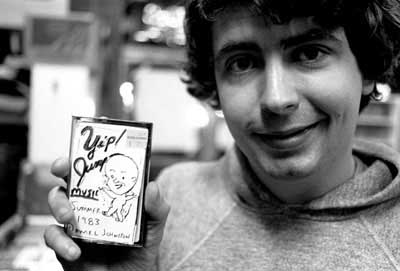A cheap plastic chord organ. Low-quality audio recordings. A high-pitched, out of tune voice. Self-pitying lyrics. A man who has long thought the devil is after him.
On the surface, these ingredients wouldn’t seem likely to mix together and produce musical greatness. The case of Daniel Johnston, however, proves an exception.
The height of Johnston’s career took place during the 1980s and 90s, wherein the young singer released cassette tapes in Austin, Texas while working at a McDonald’s. Much of the recording during this period occurred in Johnston’s brother’s garage on cheap instruments. This homestyle recording setup has become a signature of Johnston’s music, helping make him a cult figure in the outsider and low-fi music scenes.
Also during this time, Johnston’s mental well-being began to unravel. The singer has been diagnosed with manic depression and schizophrenia, spending significant portions of his life in psychiatric institutions.
Two of Johnston’s stories help illustrate the gravity of his struggles. During a psychotic episode, he pulled the key out of a two-seater plane he and his father were flying in, causing them to crash into the trees below. Luckily, both survived. Another example manifested in the form of Johnston rejecting the offer to sign on with a music label because he thought they were satanic (Johnston has long been tormented by his conception of the devil).
The relationship between art and mental illness is one often discussed, and Johnston’s own battles may influence his music. His lyrics reflect a level of vulnerability and transparency not readily found in the music world. One Johnston song might dwell in the darkness of the singer’s mind, focusing on his lack of ability to connect with others or find love. The following song could then present a hopeful, almost child-like naivety.
Perhaps it is Johnston’s mental illnesses that contribute to this intricate emotional seesawing. Whatever the reason, the end product creates an otherworldly realm, one where the listener may feel sympathetic to Johnston and his tragic life circumstances, but also see a connection to him and the universal struggles that come with being alive.
Kurt Cobain was one such listener who felt drawn to Johnston’s music. He helped to popularize it by frequently wearing a shirt with the cover of Johnston’s “Hi, How Are You?” album. This cover featured one of Johnston’s signature drawings.
Why would someone like Cobain, who epitomizes the image of cool, so proudly embrace the awkward figure of Johnston and the childishly drawn alien on the album cover?
The Nirvana singer famously dealt with his own mental battles. A staple figure of the alternative music scene, Cobain detested any sort of fakeness or fraud. Johnston’s propensity for sincerity and complete lack of irony in his music was likely appealing to Cobain, as well as the many other “outsiders” who identify with Johnston.
To further understand Johnston, it might help to examine some of his lyrics.
The song “The Story of an Artist” seems to serve as a quasi-autobiography of the singer.
Here, he presents his artistic journey in the context of how the rest of the world views him: “And we don’t really like what you do, we don’t think anyone ever will. We think you have a problem, and this problem’s made you ill.”
These lyrics bring up the question of mental illness and art. Is the “problem” in question the illness itself, or is it his pursuit of the artistic path that deviates from societal expectations? Did the illness inspire the pursuit of art, or did the pursuit of art prime him for the illness?
Another song, “Don’t Let the Sun Go Down on Your Grievances,” presents Johnston in his more hopeful state.
He sings, “Don’t let the sun go down on your grievances. Respect love of the heart over lust of the flesh. Do yourself a favor: become your own savior.”
His childlike tendencies come through here, as he mispronounces grievances each time he says it. Whereas in the previous song Johnston placed the emphasis on the surrounding world, here he puts it on the individual (likely himself) as the one with agency, who can be a personal savior. These lines sound almost biblical or cliche, but Johnston says them sincerely, serving as a mantra to help him through his own struggles while also inspiring others.
Johnston’s lyrics span the emotional gamut. Considered alongside the rest of his life and experiences, they provide a rhetorical mosaic of a supremely talented individual who either uses or defies his inner demons to produce music that speaks to the pain and beauty inherent in life.
According to typical music standards, where skilled instrument playing, mass appeal and a certain level of on-stage charisma define success, Johnston exists in an oppositional vacuum. When first hearing Johnston, the listener’s eyebrows may furrow in confusion, or they may laugh at the strangeness. However, once the weird style settles in, there is much value to be found in Johnston’s music. He puts himself out there entirely, uniquely and sincerely. Being vulnerable and sincere can prove difficult in a world filled with cynicism and irony, but Johnston lights the way with a cheap plastic chord organ in hand.
For questions/comments about this story, email [email protected] or tweet @thewhitonline.


































































































































































































